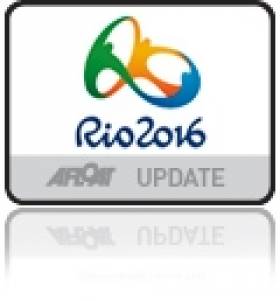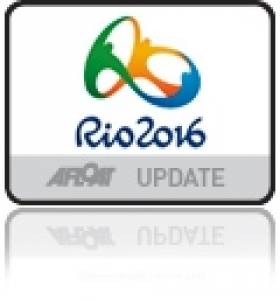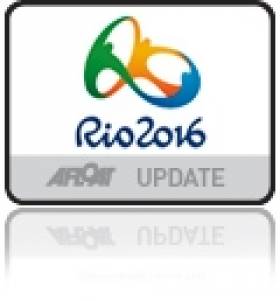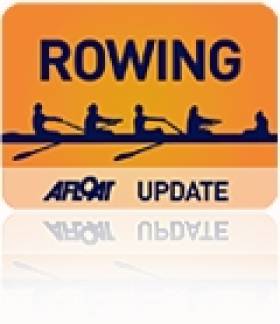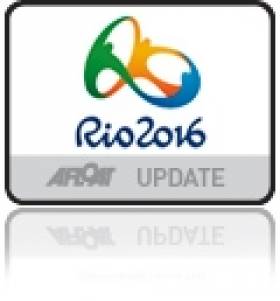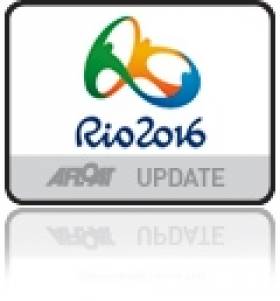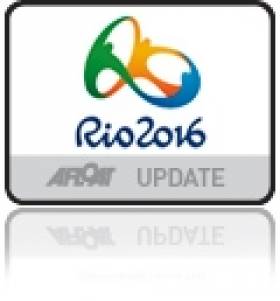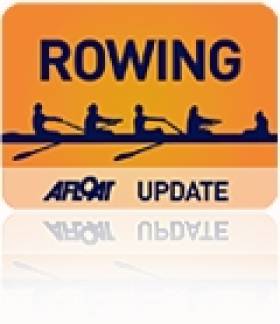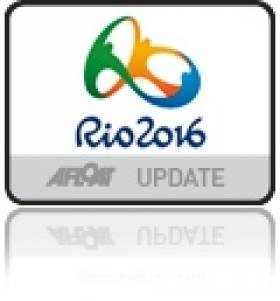Displaying items by tag: Rio
#rio2016 – Ireland's Annalise Murphy has arrived in Rio for next week's Aquece Rio - International Sailing Regatta 2014, the first test event of the Rio 2016 Olympic and Paralympic Games that takes take place from 2-9 August from the Marina da Gloria.
The Dubliner touched down in Brazil and was reunited with her boat and container that shipped to Brazil some weeks earlier. Unfortunately, her sailing gear and lost luggage has yet to be found as she posted on her facebook page.
Murphy will be one of 324 athletes from 34 nations, racing in 215 boats, it is set to be the largest Olympic classes sailing competition ever held in Brazil. Last week, the National Yacht Club sailor was crowned Women's Moth World Champion in Hayling Island.
Organised by Rio 2016 and Confederacao Brasileira de Vela (CBVela) in conjunction with the International Sailing Federation (ISAF), the regatta will test the field of play, equipment, workforce, systems and procedures two years out from the Olympic Sailing Competition.
The venue has already come in from heavy criticism from Irleland among other countries with one Irish Sailing coach branding it a 'sewer' last December.
All five proposed Olympic race course areas will be assessed during the course of the regatta. Three course areas - Ponte, Escola Naval and Pao de Acucar - are situated inside Guanabara Bay with the other two - Copacabana and Niteroi - located outside the bay in open water.
Pae de Acucar, the proposed Medal Race course area with its spectacular Rio backdrop, will be put through its paces from day one.
Come Games Time, a workforce of over 1,000 people are expected to be working on the Olympic Sailing Competition and a key objective of the Test Event is to start developing the skills of the team who will be critical to a successful regatta. The on water race committee teams are one such group and their training programme will get underway under the guidance of International ISAF officials from Brazil and overseas. More on this event here.
Meanwhile, the sailors to represent Ireland at the ISAF Sailing World Championships to be hosted in Santander, Spain from 12-21 September were announced today at a press conference in Dublin. This event will be the first opportunity to qualify Ireland for the Rio 2016 Olympic Games in the following classes:
Providence Team IRL (sailors that competed in London 2012)
49er – Ryan Seaton & Matt McGovern
Laser Radial – Annalise Murphy
Laser Standard – James Espey
ISA Development Academy (sailors in training for 2016 or 2020)
49erfx – Andrea Brewster & Saskia Tidey
Laser Standard – Finn Lynch
Also announced was that the Rio 2016 Paralympic qualifier event will take place at the IFDS World Championships in Halifax, Canada from 19-24 August. John Twomey from Kinsale will be hoping to qualify for his 11th consecutive Paralympic Games.
Providence Team IRL – Paralympic Team
Sonar (Paralympic) – John Twomey, Ian Costello & Austin O'Carroll
The Irish Sailing Team had their most successful Olympics for thirty years at London 2012 with 4th, 10th and 14th place finishes and their target is to build on this success as they commence the road to Rio 2016.
German Sailing Team Form Technology Partnership with Australian & Japanese National Sailing Teams
#rio – Three national teams are working together to develop some of the most advanced race data in the sailing world writes Andy Rice.
In preparation for the Olympic qualification regatta in Santander this September, the ISAF Sailing World Championships, the Australian and Japanese teams are working closely with Audi Sailing Team Germany to create a comprehensive wind and current model. Advanced solutions developed by the German team together with its technology partner SAP serve as the foundation for this process.
This summer marks the beginning of qualifications for the 2016 Olympic Games in Rio for the sailors. After the Football World Cup, Rio de Janeiro will welcome 400 sailors for the Olympic test regatta in Guanabara Bay. Shortly afterwards the first qualification regatta for Rio 2016 will start in Santander, Spain.
Complex tidal patterns present a unique challenge for the sailors and can make a big difference to the outcome of a race. While the international press is only talking about the poor water quality in Rio, teams are not only measuring the level of pollution but also the speed at which the water is moving.
The German team is also busy collecting data in Santander in the north of Spain. Together with the Australians and the Japanese, they are looking to log as much data over as big a time span as possible. This data will be used to create a model, allowing detailed forecasts. The technology, which creates daily tidal simulations, has been developed together with SAP and the physicist Dr Ingo Büll.
The SAP solution collates and analyses data like water and wind speeds from various points on the racecourse to create a daily current model. Multiple race strategies are evaluated, depending on the type of boat that athletes are sailing, the current windspeed and time of day.
Stefan Lacher, Head of Technology SAP Sponsorships, commented: "While other teams will use conventional tidal charts, German sailors will be able to concentrate fully on all the other challenges that an Olympic regatta poses. Using the the SAP Tide Tool will be a definite competitive advantage for the Audi Sailing Team Germany."
According to Audi Sailing Team Germany's Head of Technology, Marcus Baur, cooperating with international teams does not pose any problems. "It is only a confirmation for us, to see that the Australian and Japanese teams are interested in the solutions that we developed together with SAP. Working together like this, we will be able improve the model for Santander even more."
Seaton & McGovern Stay Second in 49ers at ISAF World Cup Hyeres
#49er – Ireland's 49er duo Ryan Seaton and Matt McGovern continue to hold second overall as the ISAF Sailing World Cup Hyères reached a critical stage on the French south coast.
Scoring 18,15 and 8 today they stay second overall narrowly ahead of Kiwi pair Marcus Hansen and Josh Porebski.
Peter Burling and Blair Tuke (NZL) showed a fine display of racing on the 49er course to stay out of trouble, avoiding a double point score like many of their competitors succumbed to. A ninth in the opening bout was followed up with a fourth and a ninth and they have a healthy 22 point lead with two days remaining.
Seaton and McGovern held on to second overall but they found the going tough discarding an 18th and count a 15th and an eighth to trail the Kiwis on 72 points. They are just a single point ahead of Hansen and Porebski
Germany's Erik Heil and Thomas Ploessel started the day emphatically in the gold fleet and in Race 10 narrowly missed out on the bullet to Manu Dyen and Stephane Christidis (FRA) as they came through in second. In Race 11 they hit back hard and were truly dominant. Leading from the outset they never truly looked threatened and eased through to a 15 second victory overall Nathan Outteridge and Iain Jensen (AUS).
Unfortunately it did not go to plan in the final race of the day for the Germans as a 25th puts them in ninth overall.
The final bullet of the day went to David Evans and Ed Powys who are 11th overall.
Over 1,100 sailors are competing at the fifth and final stage of the 2013-2014 ISAF Sailing World Cup series and it was long day out on the water with the last race concluding at 20:01 local time.
Following a delayed start to the day a shifty 10-12 knot westerly breeze tested the sailors' and the race committees.
Espersen Sees Three Ireland Women's Boats at Rio 2016
#ROWING: The annual general meeting of Rowing Ireland at Garda Boat Club today was told my Morten Espersen, the High Performance Director, that he expected to send at least three women’s boats to the Olympic Games in Rio de Janeiro in 2016. The two motions before the meeting were passed by assent: Just Sport Ireland will be adopted as the final arbitrator in grievance procedures and the agm may be called at any time through the year.
The meeting was concluded in an hour.
Branch Awards
Connacht: Mike McCrohan, Tribesmen
Leinster: Niall O’Toole, Commercial
Ulster: Gordon Reid, Lagan Scullers’
Munster: Mary Bonner, Tralee
President’s Prize: Dominic Casey, Skibbereen
No Sponsor But Record Number Set to Attend Trofeo Princesa Sofia – ISAF Sailing World Cup, Mallorca
#olympicsailing – Annalise Murphy will be the sole Irish Laser Radial campaigner in a 103–boat fleet in Mallorca in two weeks time at the latest round of the ISAF World Cup.
Murphy will be joined in Spain by London 2012 team–mates Ryan Seaton and Matt McGovern sailing the Irish 49er, 'The tighter the better'. Also in Mallorca, is single–hander James Espey in the Laser class.
In spite of the financial problems caused by the loss of the main sponsor only a few weeks ago the 45 Trofeo Princesa Sofia regatta is about to become a record edition.
Only two weeks to go to the start of the Majorcan regatta, to be held in the bay of Palma from 29th March to 5th April, a large number of entries have been received to confirm the Princesa Sofia as a must do event in the calendar of sailors from all around the world.
A large number of International teams are already training in the bay of Palma with view to the Trofeo Princesa Sofia.
With entries still open in some classes and increasing day after day, the 45th edition of the Trofeo Princesa Sofia, next to last stage of the ISAF Sailing World Cup, has 623 boats entered which add to a total of 882 sailors from 55 nations.
High participation in classes Laser, Finn and Nacra 17. With 70 boats entered, the Nacra 17 fleet, the new mixed multihull class, is a big surprise.
Furthermore, all Olympic classes will be present this year in the bay of Palma as it happened last year following some editions in which some class was missing due to a clash in the calendar with its Class event. The 2.4mR Paralympic class will also come again to Mallorca with a new venue at Real Club Náutico de Palma.
"We are very satisfied with the number and quality of entries received this year at the Trofeo Princesa Sofia –explains Ferran Muniesa, Race Manager -. We have gone through very tough weeks following the loss of our main sponsor, to whom we are grateful for their six-year sponsorship. The number of participants gives us the energy to continue working to deliver one of the best editions ever and confirms we are the favourite event for all sailors".
"I would like to thank all the team and the Organizing Clubs, Arenal, Can Pastilla and Palma, for the enormous effort they are undertaking despite the forced budget restrictions, to make sure the Princesa Sofia continues to be one of the best events in the world", adds Muniesa.
As in previous years, a large number of International teams are already training in the bay of Palma with view to the Trofeo Princesa Sofia. German, Polish, British and Danish teams, among others, have chosen Mallorca as winter training venue before the start of the European sailing season. Within this training programme, the Arenal Training Camps Trophy was held from 13th to 16th March.
In fact, the Sofia is the starting gun of the European calendar. It is also the next to last stage of the ISAF Sailing World Cup, following the event in Asia (Qingdao, China), Oceania (Melbourne, Australia) and America (Miami, United States). The next and last stop will be the ISAF Sailing World Cup Hyères, in France at the end of April. From that moment, all teams will focus on the ISAF Sailing World Championships to be held in Santander in September, an event to decide half of the nation slots for the Rio 2016 Olympics.
Annalise Vies for Irish Sportswoman of the Year Award
#annalisemurphy – Irish sailing's golden girl Annalise Murphy is in the running at lunch time for the Irish Times Sportswoman of the Year award. The 23–year–old Dubliner took consecutive gold Eurocup medals in May earning her a monthly Irish Times/Irish Sports Council award before winning a European radial title on home waters in September. The London 2012 Olympian, who wrote exclusively for Afloat's sailing annual (out now) about her super season 2013, is up against some stiff competition with seven new female stars in the running for the top award in women's sport.
Irish Sailing Coach Slams 'Disgusting' Rio Olympic Waters
#rio – An Irish Olympic sailing coach has slammed the future Olympic waters of Rio as 'disgusting', according to the Belfast Telegraph. Ian Barker, who won a silver medal for Britain in the Sydney 2000 Olympics' 49er class and now coaches Ireland, said it was the worst he had seen after sailing in 35 countries.
Sailors have expressed disgust at the filthy state of the Brazilian waters in which they will race at the 2016 Olympics, with a former British star describing it as a "sewer".
Barker was coach to Ireland's Tom Fitzpatrick and Frazer Brown in Athens 2004 and more recently to London 2012's Ryan Seaton and Matt McGovern.
He said sailors in training had to stop to disentangle their rudders from rubbish.
"It's a sewer," he told the Telegraph. "It's absolutely disgusting. Something has to be done about it. But you need the political will for these things to happen and at the moment it's not there."
"I've been sailing all over the world for 20 years now, and this is the most polluted place I've ever been," said Allan Norregaard, a Danish bronze medalist in the 2012 London Olympics.
"It's really a shame because it's a beautiful area and city, but the water is so polluted, so dirty and full of garbage."
The Belfast Telegraph has much more on the story including photos of the pollution here.
Scheidt Sounds Warning Signal to Rio Rivals at Laser Worlds in Oman
#laserworlds – Robert Scheidt sounded a warning to his Rio 2016 rivals today with an emphatic win at the 2013 Laser Standard World Championships in Oman, which moved him five places up the leaderboard into second place. Ireland's sole entry, James Espey lies 33rd overall.
Day 2 of the championships, which was also Oman's National Day, brought a change at the top after light winds at Mussanah Sports City caused postponements and frustration among competitors, resulting in ten disqualifications from four false starts in the only race of the day.
These included overnight leader Nick Thompson of Britain who dropped down to 34th place as well as former Laser World Champion Gustavo Lima from Portugal.
Croatian Tonci Stipanovic won his race in the Yellow fleet to take over the leader's yellow jersey while Pavlos Kontides from Cyprus maintained his consistent form to retain third overall. All three leaders are equal on 10 points each but Stipanovic's two outright wins in three races places him top.
Racing was postponed for three hours due to the breeze which was less than 5 knots when the first race was due to begin. But when the fleet finally got out onto the race course, the sea breeze had kicked in, remaining stable throughout a hot and sunny afternoon and building to around 13 knots.
Scheidt, eight times Laser World Champion, was delighted with his performance having led off the line and staying in front throughout. It confirmed that despite his nine year break from the Laser class and despite being 40 years old, he has a strong chance of qualifying for the Olympic Games on his home waters in Rio.
"To win a race at the Laser World Championships in this sort of breeze, you have to be fast and you have to be fit so I think I have my game back and I know it will be extremely hard but this makes me think I have a chance," he said.
"I had a good start, was clean off the line and managed to play the shifts well on the first upwind so was already in the lead at the first mark which made my life a lot easier.
"I managed to use my speed downwind and the second beat was more of a controlling race with the Croatian guy and the guy from Cyprus so I'm pretty happy. It is nice to win a race but the regatta has only just started."
The high number of disqualifications so early in the regatta was a result of frustration and the tricky conditions, Scheidt confirmed.
"It was a combination of people being aggressive and a little bit of current pushing them across the line – they didn't realize how close to the line they were which was why so many people got disqualified.
"It was tough to get a disqualification at the beginning of a regatta like that but I should think they will be a lot more careful from now on."
Thompson agreed he had taken a gamble that failed to pay off and was realistic about its implications.
"It was a close call but you couldn't call it bad luck or misfortune," admitted Thompson who has set his sights on winning the 2013 Laser World title, having missed out three times despite finishing on the podium.
"Of course I am disappointed because the black flag disqualification makes my life a lot harder from now."
Germany's Phillip Buhl staged a strong recovery after his disappointment of finishing 17th in Race 2 on Sunday with a third (yellow) in Race 3 but was frustrated when race officers cancelled the second race due the lack of time available.
"I am very happy with this result but I would have loved to have raced again because these are my favourite conditions and suit me well," he said.
He was lying second for most the race but fell to third just before the finish when Brazil's Bruno Fontes edged ahead with a surge of speed downwind.
"Hopefully in the long run it won't matter but the main thing was to be among the leaders because it was important for me to come back from finishing 17th on Sunday."
The qualifying races continue on Tuesday with two scheduled for each day until Wednesday. The finals series starts on Thursday with the last two showdowns set for Saturday.
New Rowing Course to be Built by Fermanagh and Hungarian Firms
#RowingCourse: Deane Public Works from Fermanagh will be awarded the main construction contract for the new rowing course at Lough Rynn in County Leitrim. The specialist work of design, supply and installation of the lanes will sub-contracted to Polaritas, a company from Budapest in Hungary. According to Leitrim County Council, the company have worked on the rowing courses for the 2008 and 2012 Olympic Games and will work on the installation of the rowing course for the Olympic Games in Rio de Janeiro in 2016.
The design/build contract for Lough Rynn involves the design, supply and installation of an eight-lane Albano Rowing Course to meet FISA (Fédération Internationale des Sociétés d’Aviron) Standards. The course will also be adjustable to meet canoe sprint competition rules of the International Canoe Federation.
The course may be finished by the end of this year.
#laser– Of the 324 sailors from 43 different countries who are primed and ready to start the Laser European and World Championships on Sunday, very few took the opportunity to participate in today's official practice race on Dublin Bay.
Final boat preparations in the boat parks of Dun Laoghaire's National Yacht Club and the Royal St George Yacht Club and preserving energies proved to be the main priorities as the sailors count down to the first start guns for the three different championships which will run on two race areas.
Three European titles are on offer in two Olympic singlehanded classes, for Men in the Laser Standard, and for women in the Laser Radial. Males will also compete for the Men's World and the Men's European titles in the Laser Radial class. Racing starts Sunday and finishes Friday at Ireland's only major Olympic classes championships in the lead up to the 2016 Olympic Games in Rio. Many overseas in the Men's Olympic singlehanded fleet see this as an important build up to the Laser World Championships which are taking place in Oman in November.
The event is set to be officially opened this evening by An Cathaoirleach Cllr. Carrie Smyth, Dun Laoghaire Rathdown County Council and by An Tanaiste Eamon Gilmore at Dun Laoghaire Town Hall. This opening ceremony is to be preceded by a parade led by Irish Army No 1 Band with local junior sailors carrying the flags of all 43 nations participating in the championship.
Commenting on the importance of the globally watched event Margaret Kneafsey, Event Chairman stated "We are delighted to welcome sailors from over 43 countries to the Laser European and World Championships. Many of the sailors visited Dun Laoghaire earlier this year to practice at the venue and some of the teams arrived earlier in August to train. In addition these 320 or so sailors have also brought their coaches, their families, friends and supporters to Ireland which will have a great economic impact on Dun Laoghaire town".
For Ireland's Annalise Murphy the Laser Radial Women's European Championship represents a great opportunity to win a major title on her own home waters, racing from her home club. Murphy finished seventh at the Laser Europeans last year before taking fourth at the Olympics. She has already won two major regattas this season before welcoming her overseas rivals and friends to her native Dublin Bay.
The 23 year old from Rathfarnham, eight miles from the yacht club, started her sailing at the National Yacht Club as a ten year old in the Junior section of the club, confirms she is ready to race and pre regatta nerves are not an issue for her "I have been training pretty hard this summer but I have not had any big events since June, so I am just really looking forwards to getting back out and racing against everyone, nearly everyone is here and so it is going to be tough competition".
"I am not really nervous at all. I am just looking forward to it. I have had such good training in the last five or six weeks. I was in Rio for three weeks. It was good to be there and see what the venue is like and to see what the sailing conditions are really like. It was interesting and that will really help me out in the next few years. It puts it all into perspective and then I was down in Cork to race at the Nationals".
"I feel like I am sailing well and I just need to put it together in the races. It is exciting to have all overseas sailors I know and race against from all around the world and are friends with all in my home club. That is a pretty nice feeling. Hopefully you want them to be impressed. So hopefully we will get good weather all week and there won't be too much or no wind".
Staying at her family home is a welcome, if unusual bonus, but she does not felt there will be any inherent local knowledge advantage on the water "I am staying at home which is nice to be going back to my own bed at night. I have the same routine as at major events except it is my own comfy bed".
"My form is pretty good. I have sailed well at the last three regattas I did, at Lake Garda, Holland and in Weymouth and so hopefully with the training I have done with my boat speed now I can fit that in with how I was racing a few months ago then I can do well and put together a good series. My boat speed is good, maybe not so much in windy weather but definitely in lighter weather. It is a lot better".
Winds on the opening day are forecast to be light to moderate from the south-west "I don't have a preference what the wind conditions are at all. I'd like a good mix of conditions, I'd like a good bit of light weather because that is mainly what I have been training in these last weeks. I'd like to say there is a local advantage but I really don't think there is. Probably if anything it actually confuses you more. You think you know something but maybe it is not really right".


























